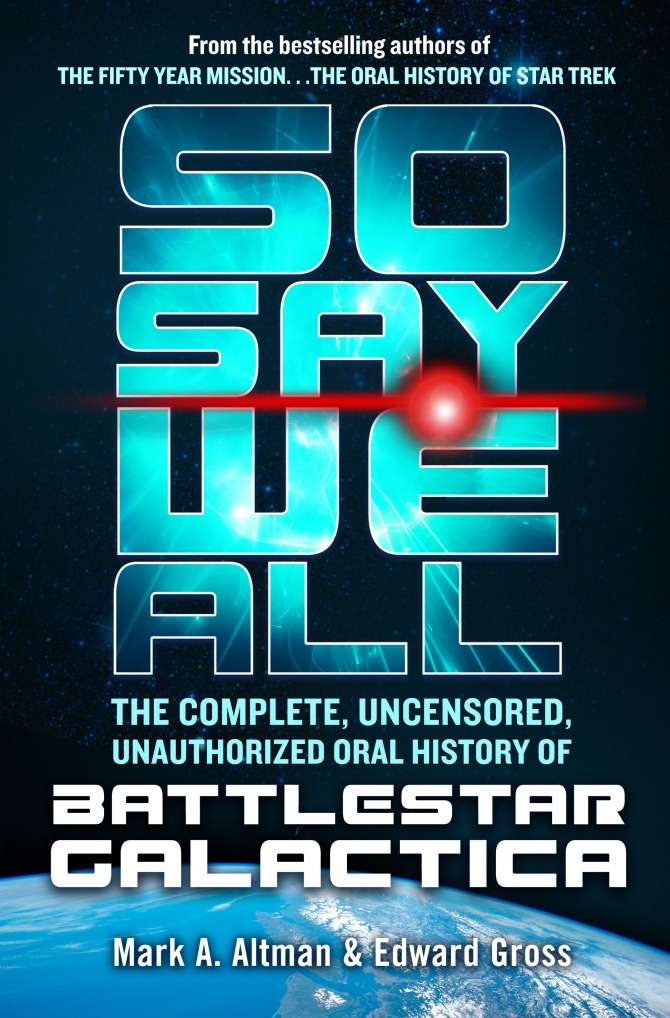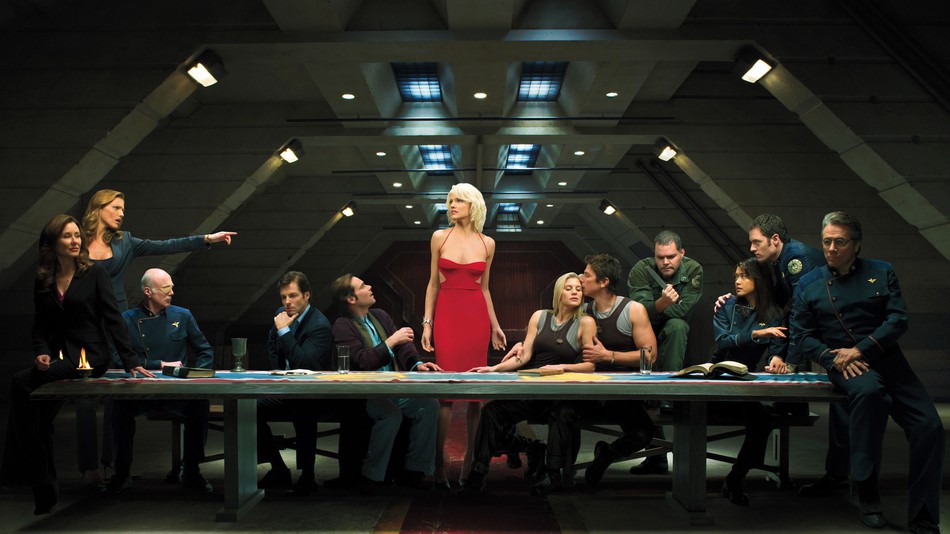Ed Gross, co-author of So Say We All, the new oral history book on Battlestar Galactica, is glad the reboot version of the show only lasted four seasons. The show’s finale aired in 2009, which is essentially the eve of contemporary internet geekdom. Conventional wisdom suggests had the show ran for a few more seasons, its reach would have been even bigger than Doctor Who or Game Of Thrones. But Gross thinks by ending on a high note, Battlestar actually dodged an enemy worse than the Cylons: toxic fandom.
“Geek culture and the critics were pretty passionate about BSG even during the time it aired,” Gross tells our US chums. “Had it lasted a few seasons longer, it could have resulted in higher ratings, but fandom would have also tried to claim a much greater ownership of the show and would have attempted to dictate how things should go.”
If you think Battlestar Galactica wasn’t popular enough to even have a fanbase big enough to generate a small group of close-minded haters, then you don’t know the history of the rag-tag, fugitive franchise. The recently released So Say We All: The Complete Uncensored, Unauthorised Oral History of Battlestar Galactica, pulls back the curtain on both the 1978 show, and the groundbreaking 2003-2009 SyFy series.

Through exhaustive research and original interviews, longtime journalists and sci-fi historians Ed Gross and Mark A. Altman (who have previously teamed up to write oral histories about Star Trek, Buffy, and Angel) reveal not only interesting bits of trivia, but startling insight into how brutally old-school fans treated the reboot prior to its debut in 2003.
“I do feel there are some original fans who could never get over the fact that the new BSG was truly a re-imagination and not a sequel or a remake,” co-author Mark A. Altman says. Although Altman and Gross both compare the resistance of old-school Battlestar fans to the outcry of classic Trekkies when the Next Generation came out in 1987, there’s something much more interesting about the BSG fandom dust-ups. Historically speaking, these controversies were recent enough to be a kind of harbinger for the brand toxicity which makes contemporary headlines in other adjacent fandoms like Star Wars. In 2017, some Star Wars fans were mad the there were a lot of women in The Last Jedi. But in 2003, a group of Battlestar Galactica fans were mad that a beloved male character had become a woman.
Imagine the trollish outcry if a new Star Wars film depicted Luke Skywalker as female or a new Star Trek reboot had a version of Spock who was transgender. This was what it was like when Battlestar showrunner Ronald D. Moore reimagined the hotshot Galactica Viper-pilot Starbuck not as a Han Solo analog, but instead, as a new, strong, female character.
In the book, Moore reveals that “one of the first things” he grappled with when rewatching the 1978 show was what do do about the “roguish, cigar-smoking, gambling, womanising” character of Starbuck. “Wow that’s such a cliche. I’ve no idea what to do with this,” Moore says. “How do you update this?” Until Moore had the very-early brainstorm: make Starbuck a woman. But, this decision, among numerous other changes, created a vitriolic backlash from fans of the original series.
On numerous internet message boards and in real life, angry fans referred to the new series as “GINO”, which stood for “Galactica in Name Only.” This outcry was made worse by the fact this fandom led and nurtured by one of the stars of the original Battlestar Galactica; Richard Hatch, who’d played the aww-shucks good guy pilot Apollo opposite Dirk Benedict’s scoundrel Starbuck. For fans of the original Battlestar, Richard Hatch was their Mark Hamill. So, if he was against a risky, dark and gritty and gender-bendy reboot, then the entire existing fandom was against it, too.
Hatch wasn’t against the reimagining of Starbuck as a woman on sexist grounds. He was against a reminaging of the series all together, which included a female Starbuck. “I was always for a continuation” Hatch says in the book. And that’s because, for years after the cancelation of the original show, Hatch had attempted to develop a continuation of Battlestar, despite not having the rights. He even sunk a huge amount of his own money into a trailer for a fan-made sequel to the series. And so, by the time 2003 rolled around, the diehard fans, led by Hatch, were determined that a serious and direct sequel was the only way to go, meaning Ron Moore’s radical reimagining of the series — complete with a female Starbuck — was downright sacreligious to the faithful.
It all came to a head at a big Galactica convention prior to the new show’s release, Ron Moore showed footage from the new series to fans and the crowd started to lose their minds.
“They booed and hissed,” Moore says in the book. “They really did, I’m not making it up. And they hated Starbuck.” When everything seemed like was getting out of control, Richard Hatch, the only person who could turn the tide, told the crowd to settle down and to treat Moore with respect.
“Richard Hatch literally had to stop fans from heckling Ron Moore at that Galactica convention,” Altman says. “It’s an early glimpse of the toxicity that would infect fandom over the next decade.”
Of course, Ron Moore’s solution to the fandom problem is now the stuff of legend. Instead of licking his wounds, he decided then and there that putting Hatch in the new series might the be best way to defeat the toxic fans at their own game. “It gave Ron the idea to cast Hatch if the miniseries got picked up to series,” Altman explains.
But, when Moore’s idea came to fruition, he didn’t cast the original Apollo in a fan-service oriented role. Instead, Hatch’s role in the reboot was, in a sense, a direct insult to the trolls who were trying to take down the new Battlestar to begin with. In the first season, when Lee “Apollo” Adama (Jamie Bamber) has to go toe-to-toe with terrorist revolutionary Tom Zarek, Moore realised it was the perfect part for Hatch.
“It felt like a really unexpected way to go,” Moore says in the book. “That Richard, who vocally had not been supportive of this iteration of Galactica, would then be the guy…in the show saying these kinds of things…questioning the people doing it and running everything.”
A more clever coup has probably never been attempted in fandom. Analogously, this would have been like Star Trek: The Next Generation casting William Shatner as villain from the past who hated the future of the 24th Century. Or, contemporarily, a hypothetical situation where J.J. Abrams asks trollish fanboys to play the treacherous Knights of Ren in Episode IX. But, the situation with Battlestar Galactica was unique. And though Hatch never truly gave up his dream of a continuation of the original Battlestar, he gleefully participated in the show, playing the treacherous Tom Zarek throughout all four seasons of the series. In fact, in the fourth season, Zarek is executed for his treason against the fleet, which, in a sense, is the lasting legacy of how Battlestar Galactica dealt with its toxic fandom problems: bring the bad fanboys in close, but always be ready, like President Roslin, to mercilessly toss that toxicity out the airlock.
These days though, things are sunnier in the BSG fandoms, maybe because of the way Moore handled things, or maybe because the show was brief enough to avoid falling into fan service traps. Either way, bubbling controversies aren’t what the show is remembered for now. Gross and Altman both point out that although division between old and new fans of Galactica may have coloured the early days of the reboot, that division doesn’t define either series today. Not one bit.
“We had a very interesting experience at the last San Diego Comic-Con,” Gross recalls “We had a packed BSG panel covering the history of the franchise, and what we discovered is that while there was a portion of the room that was most definitely consisting of fans of the original, and another portion for the reboot, there was resounding applause for the franchise as a whole. That was a really pleasant surprise.”

